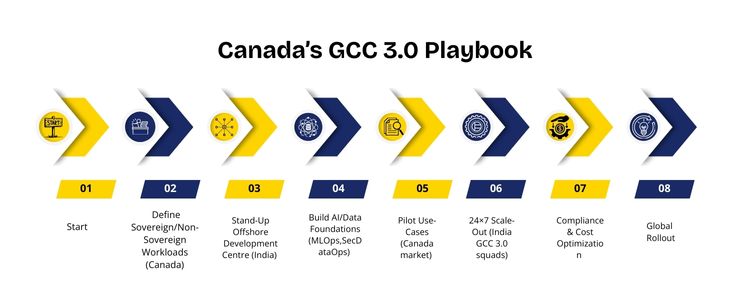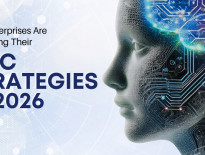
Canada is placing itself as a digital leader in terms of massive investments in AI, cloud infrastructure, and sovereign computing. Budget 2024 allocated C$2.4 billion to accelerate the uptake of AI and another C$2 billion to the investment in digital infrastructure on a national level, making a significant contribution to the global digital leadership. However, to gain a scale of innovation beyond the research realm is difficult. This is where the global capability centers (GCC) 3.0 come in: end-to-end hubs that combine talent, speed and innovation. Canada-GCC collaboration in the sphere of technological innovations creates an excellent opportunity to enhance digitalisation, minimise expenditures, and increase digital ambitions in terms of Canada’s presence worldwide. Canada has doubled down on digital competitiveness. Meanwhile, India has also become the global hub of GCC 3.0 as it features more than 1,900 GCCs, reaches US$64.6B (2024) in revenue, has 1.9M people employed, and is projected to exceed US$100B and 2.5M+ jobs by 2030. In the case of Canada, integration in the India GCC 3.0 is the most straightforward path to scale AI, software, and product innovation reliably, securely and economically. Canada has the most growth in research and talent in terms of adopting enterprise AI. But some independent surveys in 2024-25 observe Canada falling behind in AI preparedness and underdeployment of AI relative to global competitors – an execution gap between state-of-the-art AI research and at-scale digital transformation. All the while, demand is skyrocketing: with 17,196 new AI jobs being added in 2024 25 in Ontario and 39,327 retained, it is clear that commercial interest behind AI skills and solutions is real.
There is no cost arbitrage about GCC 3.0. It is a production-level (or production-grade) innovation ecosystem which combines: The GCC ecosystem in India has already run 185+ AI/ML COEs and 120K+ AI/ML professionals, thus offering the potential of fast-tracking applied AI blueprinting in Canadian enterprises.
Talent Magnetism + Time-to-Product The combination of the Global Talent Stream in Canada and high-density engineering headcount in India can be used to condense hiring and deployment timelines. Canada GSS could be used to speed the onboarding process, while India GCC 3.0 could be used to speed scaling. Innovation Bridges (Canada-India) Implement joint India-Canada digital innovation centres in generative AI, fintech and clean-tech analytics. Mature GCC 3.0 practices, such as product engineering, data platforms and SecDevOps, de-risk pilots and accelerate commercialisation in India. Digital Sovereignty by Design Push Canadian compute workloads to sovereign compute in Canada and non-sensitive engineering and test pipelines to India GCCs. Scales to meet the compute deployment in Budget 2024 whilst safeguarding IP and controlled datasets. Scale to Startups and Mid-Market Canadian scaleups can avail of India GCC 3.0 sprints as a cost-effective method of product increments, 24 x 7 SRE and model-ops. This is the mid-market GCCs where the fastest growth in scale has already begun, gaining new centres and employment through 2026. Policy Acceleration Policy & Status Take advantage of the inertia of federal AI investments and provincial ecosystems to harmonise roadmaps and procurement with GCC 3.0 delivery tracks – prototype to enterprise implementation.
Canada is ambitious in its AI-first vision, and its innovation policies will be future-ready. The implementation requires scale, cost efficiencies and global reach. GCC 3.0 offers the strategic guidebook, the provision of advanced engineering, compliance and the continuous delivery enjoyed through offshore development centres located in India. This strategic partnership will help canadian enterprises turn research into enterprise-level products and enhance digital sovereignty. Canada can translate its ambition into action and become a global leader in responsible, scalable digital innovation with India, as it has demonstrated both its Global capability centers strategy and digital innovation hubs.
When it comes to charting out your GCC 3.0 roadmap, Inductus GCC can assist you in building sovereign-ready designs, establishing India-based digital innovation hubs and offering AI products at enterprise scale – securely and responsibly, and faster. We create blueprints of global capability centres (GCC) 3.0, which create secure data frameworks, AI products, and multi-cloud bases to expand all over the world.
A GDC refers to a single-minded offshore deployment, which provides proficient business, technology and operational services to corporate bodies on a global basis. BFSI, IT services, healthcare, telecom, retail, manufacturing, and other upcoming technologies, including AI and blockchain. They do not only target cost savings but now aim at innovation, automation, R&D, digital transformation, and high-value consulting. They design and create cloud, artificial intelligence, analytics, cloud security, and process automation. A large supply of STEM graduates, multilingual workers and niche skills in AI, ML, cloud, and analytics. Aditi, with a strong background in forensic science and biotechnology, brings an innovative scientific perspective to her work. Her expertise spans research, analytics, and strategic advisory in consulting and GCC environments. She has published numerous research papers and articles. A versatile writer in both technical and creative domains, Aditi excels at translating complex subjects into compelling insights. Which she aligns seamlessly with consulting, advisory domain, and GCC operations. Her ability to bridge science, business, and storytelling positions her as a strategic thinker who can drive data-informed decision-making.
Characterising GCC 3.0 in Canada
Canada Strategic Playbook with GCC 3.0
Case-in-Point Opportunities

Economic Advantages for Canada
Vector
What Changes with GCC 3.0
Indicative Impact
Speed to Value
Follow-the-sun product and AI delivery across India–Canada
Release cycles cut, faster AI adoption (closing readiness gap)
Total Cost of Ownership
Offshore development centre + platform tooling reuse
Lower build and run costs vs. fully onshore IT outsourcing in Canada
Capacity & Skills
Access to 1.9M+ India GCC professionals, 185+ AI/ML COEs
Scale squads on demand; absorb spikes in AI/analytics work.
Sovereignty & Compliance
Workload split: sensitive data in Canada; engineering in India
Meets compute, data residency, and audit goals (Budget 2024)
Resilience
Diversified delivery locations; Tier-2 Indian cities rising
Reduced single-market risk, broader talent access
Conclusion
frequently asked questions (FAQs)

Aditi
Hey, like this? Why not share it with a buddy?
Related Posts
Recent Blog / Post
- Pharma GCC Setup Services in India: Strategic Considerations for CXOs January 9, 2026
- Why Enterprises Are Rethinking Their GCC Strategies in 2026 January 8, 2026
- Why Most Enterprise Expansion Strategies Fall Short of Projections, And How a GCC Enabler Can Bridge the Gap January 7, 2026
- India’s GCC Ecosystem: Why the World’s Biggest Companies Are Betting Their Future on it January 3, 2026
- Healthcare GCCs in India: Where the World’s Pharmaceutical Innovation Actually Happens January 2, 2026
- Circular Economy Models and Their Relevance to Manufacturing GCCs December 30, 2025
- GCCs in Agritech: Digitizing Global Food Security December 29, 2025
- Renewable Energy GCCs: Accelerating Global Green-Tech Development December 29, 2025
- Cyber Resilience 2030: Multi-Layer Security Architecture for GCCs December 26, 2025
- Building an Integrated Risk Management Framework for Multi-Region GCCs December 26, 2025
- The Ethics of Automation: How GCCs Maintain Human Oversight in AI Workflows December 25, 2025
- Future of HR in GCCs: Data-Led, Skills-Based, and GenAI-Driven December 25, 2025
- The Proposal to Standardize India’s GCCs for Unshakeable Global Leadership December 24, 2025
- Global Capability Centers: A Strategic Growth Model for B2B Enterprises December 24, 2025
- AI Ethics & Compliance Mandates for GCC Operations in 2025 December 23, 2025
















